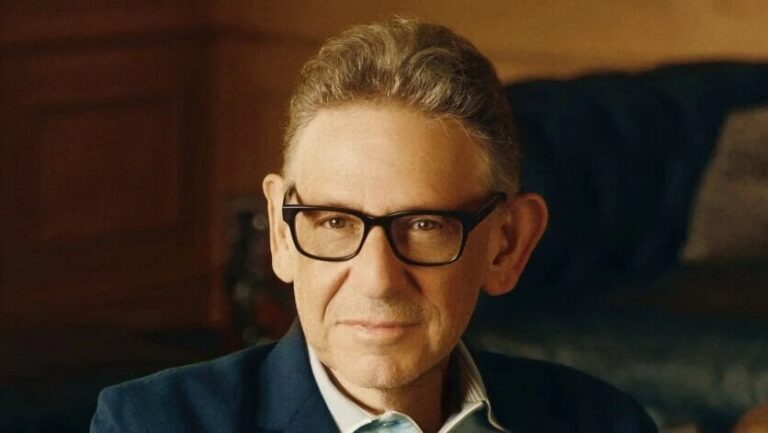Universal Music Group Chairman and CEO Sir Lucian Grainge has issued a stark warning about “irresponsible business models” in AI music, declaring that UMG will not tolerate deals that “devalue artists” and “promote the exponential growth of AI slop on streaming platforms.”
The comments appear in Grainge’s annual New Year memo to UMG staff, sent earlier today (January 8) and obtained by MBW, in which he celebrates a successful 2025 for the world’s biggest music rights company and its artists, while outlining strategic priorities for 2026.
“Validating business models that fail to respect artists’ work and creativity, and promote the exponential growth of AI slop on streaming platforms, is a grave disservice to artists, songwriters and all of us who work in music,” writes Grainge.
“Let me be clear: UMG will not stand by and watch irresponsible business models take hold, models that devalue artists, fail to provide adequate compensation for their work, stifle their creativity and ultimately, diminish their ability to reach fans.”
Notably, Grainge’s pointed language on this topic comes as UMG continues active litigation against AI music generator Suno, a company with which rival Warner Music Group settled and struck a licensing deal in November 2025.
(Sony Music, Germany’s GEMA, and Denmark’s Koda are all also actively suing Suno.)
“LET ME BE CLEAR: UMG WILL NOT STAND BY AND WATCH IRRESPONSIBLE BUSINESS MODELS TAKE HOLD—MODELS THAT DEVALUE ARTISTS, FAIL TO PROVIDE ADEQUATE COMPENSATION FOR THEIR WORK, STIFLE THEIR CREATIVITY AND ULTIMATELY, DIMINISH THEIR ABILITY TO REACH FANS.”
SIR LUCIAN GRAINGE, UMG
In the memo, Grainge positions UMG’s own AI strategy between what he characterizes as two “equally flawed” extremes: those who believe there should be no engagement with AI, and those who think “we should acquiesce to accepting whatever AI models are released, regardless of their ethicality.”
“When it comes to new technology, we engage, adapt and innovate,” he writes, citing decades of technological change in the music industry, “from the player-piano to the phonogram to radio to vinyl, cassette, MP3, downloads, ad-funded streaming into premium subscription”.
“At the same time, that approach must be thoughtful, strategic, commercial and nuanced,” Grainge adds.
AI PARTNERSHIPS AND NVIDIA ALLIANCE
The memo follows UMG’s recent announcement of a strategic partnership with AI computing giant NVIDIA, which Grainge describes as “first-of-its-kind” and aimed at fundamentally transforming “music discovery and fan engagement.”
Grainge notes that UMG became “the first media company to enter into AI-related agreements with established platforms such as YouTube, Meta, TikTok, and KDDI as well as with emerging AI entrepreneurs such as Udio, BandLab, Soundlabs, KLAY Vision, Splice and Stability AI” in 2025.
“With all of our agreements, we have simultaneously protected artists and songwriters and human creativity, spawned a new wave of creative innovation in music and developed new revenue streams and commercial opportunities,” he writes.
The memo emphasizes that UMG’s AI partnerships “place artists at the center of everything we do,” with NVIDIA quoted as saying the collaboration will proceed “responsibly, with safeguards that protect artists’ work, ensure attribution, and respect copyright.”
STREAMING 2.0 AND ARTIST-CENTRIC
The memo also highlights progress on UMG’s Streaming 2.0 initiative, with deals implemented with Amazon, Spotify and YouTube in 2025, and more agreements expected in 2026.
Grainge credits the company’s Artist-Centric initiative, launched three years ago, with accurately predicting “the dramatic increase in the volume of irrelevant uploads, including the rise of AI ‘slop.’”
“This ability to see around corners enabled us to anticipate this trend and protect our artists and songwriters by preemptively placing provisions in our agreements with DSPs that prevent AI slop from being counted in the same royalty pools as our artists and songwriters,” he writes.
Grainge confirms that these initiatives delivered on commitments outlined at UMG’s Capital Markets Day in September 2024, demonstrating the company’s “capability to effectively develop, harness and adapt strategies to the benefit of the entire music ecosystem.”
2026 PRIORITIES: SUPERFANS, DOWNTOWN, GLOBAL EXPANSION
Looking ahead, Grainge outlines several strategic priorities for 2026.
Superfans and retail expansion: A key focus will be serving superfans through “enhanced premium tiers” with DSP partners and emerging platforms focused on “special events and products for superfans, both virtually and in the physical world.”
“In 2026 we will accelerate these efforts both by working with our established DSP partners on the launch of enhanced premium tiers for superfans, as well as by working with emerging platforms that are focused on special events and products for superfans, both virtually and in the physical world,” writes Grainge.
He also notes that UMG has “recently established a portfolio of retail stores in Tokyo, Madrid, New York and London as a complement to our growing D2C business.”
The company plans to scale this activity in 2026, “including the expansion of our experiential hospitality strategy and seamless integrations between virtual and IRL events for superfans.”
Independent services: A section of the memo is dedicated to services for independent labels. “It’s no secret that much of our company’s success is powered by our entrepreneurial culture and decentralized structure, so identifying and partnering with like-minded leaders and entrepreneurs will only help ensure our continued future success,” Grainge writes.
The memo also references the “anticipated closing” of UMG’s proposed $775 million acquisition of Downtown Music, which is currently being assessed by the European Commission. (UMG has proposed divesting Downtown’s Curve royalty accounting business to address EC concerns over the deal. The EC has until February 27 to make a decision).
“With the anticipated closing of our acquisition of Downtown Music, and by continuing to broaden our independent partner portfolio, we want to accelerate our efforts in providing best-in-class services to both independent entrepreneurs and labels,” says Grainge.
Global expansion: UMG will “continue to broaden our global presence in fast-growing markets through organic A&R within our growing network of local labels, as well as through partnerships and acquisitions of dynamic music companies in Africa, China, India and Southeast Asia.”
Grainge highlighted the recent news that Universal Music India has become a significant minority shareholder in Excel Entertainment, “a leading Indian film and digital content studio,” expanding opportunities for Indian artists and strengthening UMG’s position in original soundtracks.
You can read his note in full below:
Dear Colleagues:
Happy New Year! I hope you all had a great holiday season with your loved ones and friends. And welcome back to what I anticipate will be another exciting and historic year for all of us.
To give you some context as to why I think 2026 looks so promising, I’ll briefly describe for you the major opportunities we will be pursuing. As I like to do this time of year, let’s take a look back at the last year to celebrate our artists and the incredible accomplishments we worked tirelessly to help them achieve, and to highlight some of the significant strategic advances we made last year in AI, our ongoing commitment to Streaming 2.0 and the contributions we collectively made with our Global Impact Team.
Artists’ Achievements:
Our single greatest investment every year is our investment into artists and the infrastructure we build to support them and amplify their creativity. By combining talent, expertise, and long-term vision, our foundation of artist development consistently delivers lasting success. In 2025, once again, that success was on full display. The list of our artists and songwriters’ remarkable performances last year is so long that I had to detail it in a section at the end of this note given there are just so many deserved acknowledgements!
For now, though, here are just a handful of the global highlights:
- On Spotify: we had four of the Top 5 Artists (Taylor Swift, The Weeknd, Drake and Billie Eilish); six of the Top 10 Albums and three of the Top 5 (KPop Demon Hunters Soundtrack, Billie Eilish HIT ME HARD AND SOFT, and Sabrina Carpenter Short n’ Sweet); and six of the Top 10 Songs (with Lady Gaga & Bruno Mars “Die With A Smile” at No. 1 and Billie Eilish “BIRDS OF A FEATHER” at No. 2). Seven of the of the Top 10 Global Artists are UMPG songwriters: Bad Bunny (No. 1), Taylor Swift (No. 2), The Weeknd (No. 3), Drake (No. 4), Billie Eilish (No. 5), Kendrick Lamar (No. 6), and Ariana Grande (No. 8).
- On Apple Music: Our artists had seven of the Top 10 Songs globally, including four of the Top 5 (Kendrick Lamar & SZA “luther”; Lady Gaga & Bruno Mars “Die With A Smile”; Kendrick Lamar “Not Like Us”; and Billie Eilish “BIRDS OF A FEATHER”). Drake was the most streamed artist worldwide, while Morgan Wallen’s I’m The Problem was the most streamed album. UMPG’s songwriters were represented across 15 of the Top 20 Songs globally, including “APT.” from ROSÉ & Bruno Mars at No. 1, and contributions to four of the Top 5.
- On Amazon Music: UMG had all of the Top 5 Albums (KPop Demon Hunters, Morgan Wallen I’m the Problemand One Thing At A Time, Sabrina Carpenter Short n’ Sweet, and Taylor Swift The Life of a Showgirl); seven of the Top 10 Artists, including the Top 3 (Taylor Swift, Morgan Wallen and Mrs. GREEN APPLE); seven of the Top 10 Most Requested Artists on Alexa (Taylor Swift, KPop Demon Hunters cast, Morgan Wallen, Lady Gaga, KAROL G, Billie Eilish and Eminem); seven of the Top 10 Vinyl Albums (Taylor Swift The Life of a Showgirl, Kendrick Lamar GNX, Taylor Swift reputation, Gracie Abrams The Secret of Us, Wicked: The Soundtrack, The Beatles Abbey Road and The Beatles Anthology Collection (2025 Remaster).
- On TikTok: Global Artist of the Year (KATSEYE) and seven of the Top 10; Track of the Year (“Pretty Little Baby” recorded by Connie Francis in 1962) and four of the Top 5; Most-Saved Artist of the Year (Taylor Swift); and Music Trend of the Year (“Anxiety” by Doechii).
- On Deezer: UMG had the four Most-Streamed Artists (Lady Gaga, Taylor Swift, Billie Eilish and The Weeknd); nine of the Top 10 Albums; six of the Top 10 Songs; and the Most-Shared Song Worldwide (Lola Young’s “Messy”).
No other company—in music or any other sector of entertainment—has ever achieved such a level of success and done so with such consistency. And it is you, the UMG team, that drives our historic success, year after year. I’m so proud of you!
AI in 2025
As we all witnessed, AI became the dominant economic and cultural narrative last year—with the potential to disrupt aspects of many businesses.
While I fundamentally believe AI, deployed responsibly, can be a hugely beneficial commercial and creative driver for UMG and our artists, we cannot overlook the fact that AI’s blossoming ubiquity can also create challenges, particularly from those who act in disregard for the rights of artists, songwriters and other rightsholders. Therefore, it’s important that music and artists don’t get lost in a global AI conversation. The reality is that given the size of our industry compared to others grappling with the massive implications of AI (IT, healthcare, financial services, manufacturing and transportation to name a few)—we have punched way above our weight on the global stage to ensure that the interest of artists and music companies are front and center. And we will continue to do so. The opportunities AI can deliver kept us working tirelessly through the year and my personal commitment to the artist and songwriter community is that, in 2026 and beyond, music will remain central to the AI conversation in terms of technology, public policy and commercial opportunity.
Our proactive strategic approach to harnessing AI led UMG to be the first media company to enter into AI-related agreements with established platforms such as YouTube, Meta, TikTok, and KDDI as well as with emerging AI entrepreneurs such as Udio, BandLab, Soundlabs, KLAY Vision, Splice and Stability AI.
With all of our agreements, we have simultaneously protected artists and songwriters and human creativity, spawned a new wave of creative innovation in music and developed new revenue streams and commercial opportunities. The substantial progress we made last year on multiple fronts makes me extremely optimistic about AI’s enormous positive potential in the years ahead.
Streaming 2.0
While our work in AI commanded much of the press’s attention, another important strategic advance of which I’m proud has been our continued progress in reaching “Streaming 2.0” agreements with our DSP partners. These agreements encourage smarter consumer segmentation, accelerate geographic expansion, create greater consumer value and drive ARPU growth. In 2025 we implemented Streaming 2.0 deals with Amazon, Spotify and YouTube, and we expect to enter into more such agreements in 2026. At the same time, three years ago, when we announced our Artist-Centric initiative, we accurately predicted the fact that the dramatic increase in the volume of irrelevant uploads, including the rise of AI “slop,” could overwhelm DSPs. This ability to see around corners enabled us to anticipate this trend and protect our artists and songwriters by preemptively placing provisions in our agreements with DSPs that prevent AI slop from being counted in the same royalty pools as our artists and songwriters (among other Artist-Centric components we’ve implemented to advance the interests of artists and reward the value they bring to these platforms).
Fueled by our Streaming 2.0 initiatives, I’m pleased that over the past year, we have delivered on the vision and commitments that we outlined at our Capital Markets Day in September 2024, with growth performance metrics that demonstrate our capability to effectively develop, harness and adapt strategies to the benefit of the entire music ecosystem.
Global Impact
Some of the most enthusiastic feedback I receive from you relates to the work we do with our Global Impact Team. The work is a direct reflection of the passion and commitment of our colleagues around the world to create positive impact with efforts focused on mental health, sustainability, music education and community support.
Working closely with our partners—Mental Health Coalition, Project Healthy Minds and Music Health Alliance—we directed funding to organizations focused on creating and expanding mental health services to help individuals in communities across the music industry and around the world.
And our focus on the intersection of music and health and wellness has also led to innovative commercial opportunities for our artists, while helping their fans. For example, in May we launched Sound Therapy with Apple Music, combining music from more than 250 of our participating artists using Sollos, our proprietary audio technology initiative, to help fans focus, relax and sleep. Already, the performance of Sound Therapy has exceeded our expectations.
We also broadened our sustainability initiatives in 2025. By partnering with innovative suppliers, reimagining manufacturing processes, and collaborating across the industry, UMG continued to reduce its share of global climate pollution in almost everything we do, from the merch and audio products we sell, to the electricity that powers our work. And we joined as founding donors to EarthPercent, which mobilizes artists and the music industry to channel funding and raise awareness for high-impact climate and nature solutions around the world.
Over the course of the year, in collaboration with educational institutions, public school systems and nonprofit partnerships, we mobilized our artists, labels, employees and fans around programs and initiatives that foster the next generation of industry leaders. We launched career pathway programs and major scholarships to bolster and support global access to free music education for young people around the world.
And when disaster struck, we were there to help, providing critical support to employees and community members including those impacted by the L.A. wildfires this time last year.
Honors and Awards
Our efforts in sustainability have been recognized by numerous organizations, including UMG’s being named by Newsweek as one of the “World’s Greenest Companies” and our winning the “ESG Transparency Award”, acknowledging our exceptional clarity and openness in sustainability reporting.
Recognizing our strong internal culture, we were named by Forbes as one of America’s Dream Employers—No. 1 in Media and Advertising and No. 5 overall out of 500 companies across multiple industries.
Finally, for the first time ever, I was so pleased for us that Time magazine honored UMG as one of the most influential companies in the world last year, the first recognition of a major music company in the list’s history. That recognition specifically cited our commitment to defending artists’ rights, championing a more equitable, Artist-Centric streaming landscape for artists and songwriters, and shaping culture through the power of artistry.
2026 and Beyond
Of course, our central focus will continue to be—as it always has been—artist development and the industry-leading investment we make in artists, along with the global resources that support them.
And this year will also see us focusing much of our energy on growing our presence in broader touchpoints of our expanding industry, extending our geographic footprint, and continuing to lead the way in the development and growth of responsible AI.
Services to Independent Labels
We’ll be developing different models, structures and competencies to service and grow an increasingly vibrant diversity in music. It’s no secret that much of our company’s success is powered by our entrepreneurial culture and decentralized structure, so identifying and partnering with like-minded leaders and entrepreneurs will only help ensure our continued future success while supporting the health of the entire music ecosystem.
With the anticipated closing of our acquisition of Downtown Music, and by continuing to broaden our independent partner portfolio, we want to accelerate our efforts in providing best-in-class services to both independent entrepreneurs and labels.
Streaming 2.0, Artist-Centric and the Superfan
A key part of our Streaming 2.0 initiative and Artist-Centric strategy is serving superfans and bringing them closer to our artists. In 2026 we will accelerate these efforts both by working with our established DSP partners on the launch of enhanced premium tiers for superfans, as well as by working with emerging platforms that are focused on special events and products for superfans—both virtually and in the physical world. For example, we have recently established a portfolio of retail stores in Tokyo, Madrid, New York and London as a complement to our growing D2C business, including our network of online artist and branded stores, which reached new heights this past year. 2026 will see additional scaling of this activity, including the expansion of our experiential hospitality strategy and seamless integrations between virtual and IRL events for superfans. All of this activity is further evidence that the very definition of UMG is expanding, while our direct connection with music consumers is growing.
Global Footprint
We will continue to broaden our global presence in fast-growing markets through organic A&R within our growing network of local labels, as well as through partnerships and acquisitions of dynamic music companies in Africa, China, India and Southeast Asia. This will include continuing to identify the most accomplished entrepreneurs and independent labels that will provide access to some of the best artists and music in those regions, but also the ability to grow the influence of those artists and their music in markets around the world.
And we’re already getting started. Earlier this week, we announced that Universal Music India will become a significant minority shareholder in Excel Entertainment, a leading Indian film and digital content studio. The deal will expand opportunities for Indian artists and strengthen our position in original soundtracks, which remain at the heart of India’s high-potential music market.
AI in 2026 and Beyond
Of course, AI will continue to have an impact on global industries, including ours, and UMG will continue—as we have with every prior technological innovation—to lead in AI initiatives and sit at the big table where we can help shape the future of music.
On Tuesday we announced a first-of-its-kind alliance with NVIDIA, the world’s leading accelerated computing and AI company. The scope of ambition behind this announcement is simple yet profound: to fundamentally transform the music experience, enriching and enhancing it for fans the world over. And that transformation covers everything, from artist tools for music creation to music discovery and fan engagement. NVIDIA articulated the relationship perfectly when they said, “we’re entering an era where a music catalog can be explored like an intelligent universe — conversational, contextual, and genuinely interactive… And we’ll do it the right way: responsibly, with safeguards that protect artists’ work, ensure attribution, and respect copyright.” The fact that the most influential AI enterprises like NVIDIA are prioritizing partnerships with UMG in their media sector strategies suggests a clear recognition of the significant win-win potential in market-led solutions to harnessing AI innovation. Our work with NVIDIA will be a multi-year partnership and, like our other AI initiatives, places artists at the center of everything we do.
I’m confident that our approach to AI is the right one, and differs meaningfully from two other approaches that are equally flawed. Even as UMG leans into AI, there are some corners of the creative sector occupied by those who think there should be no engagement with AI. Meanwhile on the other extreme, there are some who believe that the “genie is out of the bottle,” so we should acquiesce to accepting whatever AI models are released, regardless of their ethicality.
If we’ve learned anything over the prior decades, it’s that trying to smother emerging technology is futile… and as history has demonstrated, completely counterproductive! The link between music and technology has been the fundamental growth driver of the music industry for more than a century from the player-piano to the phonogram to radio to vinyl, cassette, MP3, downloads, ad-funded streaming into premium subscription and so on.
That is why, when it comes to new technology, we engage, adapt and innovate. Whether that’s being the first to embrace streaming and ad-funded models, or striking the first deals to monetize music on social platforms, we must lean in and take the reins in determining our future.
And that is exactly how we will continue to approach AI.
At the same time, that approach must be thoughtful, strategic, commercial and nuanced. Validating business models that fail to respect artists’ work and creativity—and promote the exponential growth of AI slop on streaming platforms—is a grave disservice to artists, songwriters and all of us who work in music. Let me be clear: UMG will not stand by and watch irresponsible business models take hold—models that devalue artists, fail to provide adequate compensation for their work, stifle their creativity and ultimately, diminish their ability to reach fans.
Protecting our artists, our people, our company and our industry is not just a job to me, it’s a mission.
And it’s about something even bigger. The importance of music to humanity throughout the world cannot be overstated. Our role in partnering with artists to produce the most popular music on the planet has an impact that far exceeds our imagination. The music artists create is—and always will be—an extraordinarily meaningful part of the lives of billions of people around the globe. Music is simply beautiful.
Since I was a teenager, I have spent my career investing in and fighting for artists, and I will never stop. It is the privilege of my life to be able to do this work with all of you. The more seismic the changes that come our way, the more energized I become. Together, we continue to march on!
Welcome to 2026!
LucianMusic Business Worldwide















